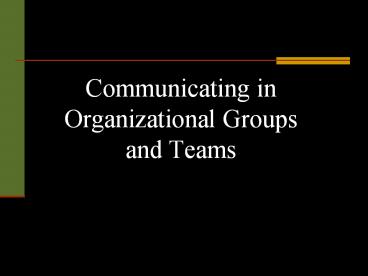Communicating in Organizational Groups and Teams PowerPoint PPT Presentation
1 / 19
Title: Communicating in Organizational Groups and Teams
1
Communicating in Organizational Groups and Teams
2
Definition of a Group
- A group is a collection of three or more
individuals who perceive themselves as a group,
posses a common fate, and communicate with one
another over time to accomplish both personal and
group goals.
3
Managers and Leaders Are Different
Organizational Roles
- A role is an expectation about individual
behavior patterns. - Managers establish performance criteria, monitor
and evaluate employees. - Leaders define how issues are interpreted and
motivate members to transcend self-interest.
4
Managers and Leaders Are Different
Organizational Roles
- Leadership
- Based on a consensual agreement whereby people
share basic objectives and values
- Management
- Based on a contractual agreement whereby each
person gives up something in order to get
something else
Area of Shared Agreement
Exchange Contract
5
Leaders Define the Teams Focus
- Use symbols to create a compelling vision
- Labels Catchy names or sayings
- Heroes People that exemplify a vision
- Rituals Events that mark milestones
6
Leaders Define the Teams Focus
- Encourage identification of members interests
and goals - Praise team accomplishments
- Articulate shared values
- Use the presumed we
- Identify a common enemy
7
Groupthink!!
- Too little conflict can be a bad thing
8
Groupthink A Theoretical Model
Decision Makers Constitute a Cohesive Group
Symptoms of Groupthink
Concurrence Seeking
Structural Faults of the Larger Organization
Symptoms of Defective Decision Making
Low Probability of Successful Outcome
Provocative Situational Context
9
Groupthink A Theoretical Model
Insulation of the group Lack of tradition of
impartial leadership Lack of norms requiring
methodical procedures Homogeneity of members
social background and ideology
Decision Makers Constitute a Cohesive Group
Symptoms of Groupthink
Concurrence Seeking
Structural Faults of the Larger Organization
Symptoms of Defective Decision Making
Low Probability of Successful Outcome
Provocative Situational Context
10
Groupthink A Theoretical Model
High stress from external threats with low hope
of a better solution than the leaders Low
self-esteem temporarily induced by recent
failures, excessive decision-making difficulty,
or moral dilemmas
Decision Makers Constitute a Cohesive Group
Symptoms of Groupthink
Concurrence Seeking
Structural Faults of the Larger Organization
Symptoms of Defective Decision Making
Low Probability of Successful Outcome
Provocative Situational Context
11
Groupthink A Theoretical Model
Illusion of invulnerability Belief in the
inherent morality of the group Collective
rationalization Out-group stereotyping Self-censor
ship Illusion of unanimity Direct pressure on
dissenters Self-appointed mindguards
Decision Makers Constitute a Cohesive Group
Symptoms of Groupthink
Concurrence Seeking
Structural Faults of the Larger Organization
Symptoms of Defective Decision Making
Low Probability of Successful Outcome
Provocative Situational Context
12
Groupthink A Theoretical Model
Incomplete survey of alternatives Incomplete
survey of objectives Failure to examine risks of
preferred choice Failure to reappraise initially
rejected alternatives Poor information
search Selective bias in processing information
at hand Failure to work out contingency plans
Decision Makers Constitute a Cohesive Group
Symptoms of Groupthink
Concurrence Seeking
Structural Faults of the Larger Organization
Symptoms of Defective Decision Making
Low Probability of Successful Outcome
Provocative Situational Context
13
Some Steps for Preventing Groupthink
14
Some Steps for Preventing Groupthink
- Group leaders should assign the role of critical
evaluator to each member, encouraging the group
to give high priority to airing objections and
doubts.
15
Some Steps for Preventing Groupthink
- Group leaders should be careful to avoid stating
preferences and expectations at the outset of
meetings and planning sessions.
16
Some Steps for Preventing Groupthink
- Break the group into smaller units, each assigned
to work on the same problem separately.
17
Some Steps for Preventing Groupthink
- Periodically invite qualified individuals outside
the group to participate by evaluating group
ideas and processes.
18
Some Steps for Preventing Groupthink
- Assign at least one member the role of devils
advocate for each group meeting.
19
Some Steps for Preventing Groupthink
- After reaching initial consensus on a decision or
solution, hold a second chance meeting at which
each member is expected to rethink the issue and
express any remaining doubts.

